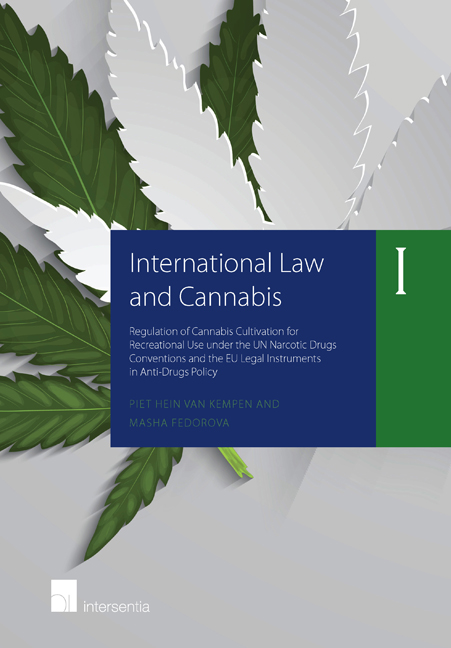 International Law and Cannabis I
International Law and Cannabis I Book contents
- Frontmatter
- Preface
- Contents
- List of Cases
- List of Abbreviations
- Chapter 1 Introduction
- Chapter 2 Obligations under International Law Regarding Cannabis: UN Narcotic Drugs Conventions
- Chapter 3 Obligations under European Law Regarding Cannabis: EU Laws on Drugs
- Chapter 4 Assessment of the Arguments and Initiatives Regarding Regulation of Cannabis Cultivation
- Chapter 5 Conclusion
- Bibliography
- Executive Summary of Volume II
- About the Authors
Chapter 3 - Obligations under European Law Regarding Cannabis: EU Laws on Drugs
Published online by Cambridge University Press: 09 November 2019
- Frontmatter
- Preface
- Contents
- List of Cases
- List of Abbreviations
- Chapter 1 Introduction
- Chapter 2 Obligations under International Law Regarding Cannabis: UN Narcotic Drugs Conventions
- Chapter 3 Obligations under European Law Regarding Cannabis: EU Laws on Drugs
- Chapter 4 Assessment of the Arguments and Initiatives Regarding Regulation of Cannabis Cultivation
- Chapter 5 Conclusion
- Bibliography
- Executive Summary of Volume II
- About the Authors
Summary
INTRODUCTION
Although the UN narcotic drugs conventions already constitute a strict and detailed drug control system that applies to the entire European Union, the fight against drugs is also the subject of legislation in the Union. This chapter provides an elaborate account and analysis of the EU laws on drugs insofar as these are relevant for cannabis cultivation for recreational use. Please note that the EU-framework is closely connected to the Single Convention and the Illicit Traffic Convention. In the case of the latter convention, the European Union itself is a party, with respect to the areas within the competence of the Union. The instruments of the Union only aim to supplement the UN narcotic drugs conventions. The reason for adopting additional instruments is that the member states (initially the signatories to the Schengen Agreement and eventually the entire Union) deem the measures in these instruments to be necessary to compensate for the negative effects of the abolition of checks at the internal borders within the Union. Therefore, the key question in this chapter is twofold. First: what is the extent of the obligations under the EU laws on drugs regarding cannabis cultivation? Secondly: to what extent and in what manner does European law supplement the obligations that ensue from the UN narcotic drugs conventions? In a European context, there are three important instruments:
Schengen acquis (1985 and 1990)
Joint Action of the European Union to combat drug addiction and to prevent and combat illegal drug trafficking (1996)
Council Framework Decision laying down minimum provisions on the constituent elements of criminal acts and penalties in the field of illicit drug trafficking (2004).
The Schengen acquis, under which checks at the internal borders of the states parties are abolished with a view to completing the internal market, forms the first common framework for transnational cooperation in the area of combating the illicit trade in narcotic drugs, cannabis included. As a consequence of the creation of the European Union, the legal basis for the Union‘s action in the field of criminalizing and sanctioning illicit drug trafficking is found in Article 83 of the Treaty on the Functioning of the European Union (TFEU).
- Type
- Chapter
- Information
- International Law and Cannabis IRegulation of Cannabis Cultivation for Recreational Use under the UN Narcotic Drugs Conventions and the EU Legal Instruments in Anti-Drugs Policy, pp. 101 - 138Publisher: IntersentiaPrint publication year: 2019


